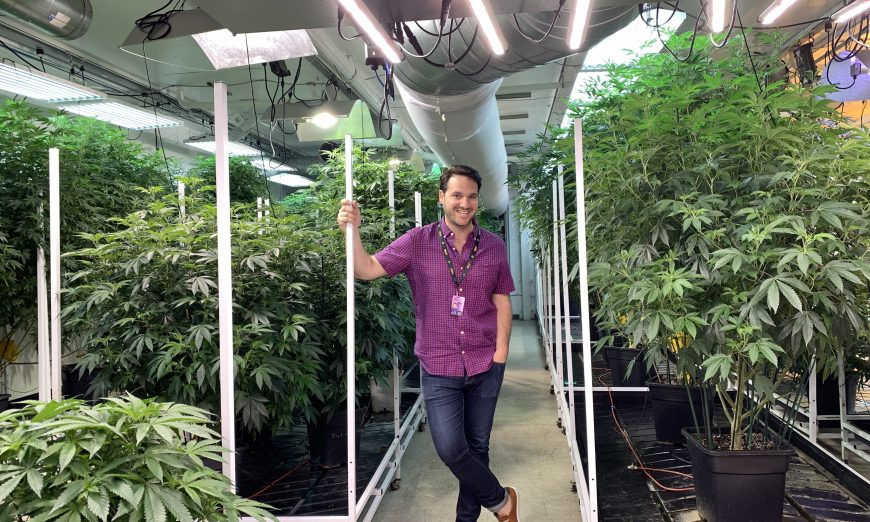Unlike Santa Clara, San Jose has embraced legal cannabis businesses within its city limits. One exemplary business is Airfield Supply Company (www.airfieldsupplyco.com). It began selling recreational (in addition to medical) marijuana on Jan. 1, 2018.
Airfield Supply Company is licensed to grow marijuana inside its 20,000-square-foot, two-story facility at 1190 Coleman Ave., by San Jose Airport. Its reputation is such that officials from other municipalities have toured it to view best practices.
The company takes its name and aeronautical décor from its proximity to the airport. Its website states that “high is a destination” and that its team (of about 165 employees) will “prepare you for takeoff.”
Customers show their ID before entering the sleek, modern lobby and then again at the reception desk. Couches and chairs are positioned near a large interior window that provides a view of the grow room with about 30 varieties of marijuana mother plants.
Behind the lobby is the salesroom with an aircraft propeller attached to one wall. Customers wait in lines that are roped off like airport security check-in lines. Marijuana products are displayed behind counters, where trained team members assist customers.
On the second floor are nine rooms where cuttings — about 8,000 at any one time — from the mother plants are cultivated. About 1,000 are harvested weekly, yielding about 65 pounds. The sophisticated process is both a science and art.
From cutting and rooting to harvest takes three months. Temperature, light, and water are adjusted for each stage of the plant growth. Plants are rotated from one growing room to another as they mature. The best clones are used to start new mother plants, which have a six-month life span.
Jason Fish, a graduate of San José State University, takes pride in the nursery he set up and manages.
“I am truly blessed and grateful for the opportunity to grow together with such an outstanding team at Airfield’s state-of-the-art facility,” said Fish.
Marijuana Laws
Marijuana is illegal under Federal law. However, in 1996, California became the first state to legalize medical marijuana.
Then in the Nov. 8, 2016 election, California voters passed Proposition 64, the Adult (21 and over) Use of Marijuana Act, by a “yes” vote of 57 percent, making California the sixth state to fully allow marijuana sales and use for all purposes.
Proposition 64 gives statutory authority to local cities and counties to regulate or prohibit commercial sale and distribution within their jurisdictions. On Nov. 6, 2018, Santa Clara voters passed Measure M, establishing a tax of up to 10 percent on gross receipts if and when cannabis sales are permitted in the city.
San Jose collects a 10 percent tax from the 16 registered, legal marijuana businesses within its boundaries and is not now accepting new applications.
Airfield Supply Company CEO Marc Matulich said that the City of San Jose implemented regulations before the state laws came into effect, thus setting dispensaries up for success ahead of time.
On May 21, 2019, the Santa Clara City Council adopted Ordinance No. 2000, extending a Nov. 2017 temporary ban on all commercial cannabis activities until June 30, 2020. Visit the City website for a timeline of cannabis actions: santaclaraca.gov/government/departments/city-manager/cannabis.
Locally, Mountain View, as well as San Jose, allows commercial marijuana businesses. Sunnyvale prohibits them.
Pro Position
Matulich, a graduate of UC Santa Barbara with a degree in business and economics, makes the case for allowing licensed cannabis businesses in communities.
“People fear what they don’t know and haven’t come to understand,” said Matulich. “We contribute to the local economy, bringing significant tax revenues.”
“By allowing a regulated business to distribute cannabis responsibly, you are cutting into the black market, which distributes cannabis illegally, including to kids. You’re reducing the number of illegal people in the market.
“Safe, legal businesses close to their home communities reduce black market sales to seniors and veterans who use marijuana for medical relief,” continued Matulich.
The safety and security of customers and employees are important to Airfield Supply Company. It has security cameras and security guards on site 24/7. The police department always has access.
“This enhanced security makes the surrounding area secure,” said Airfield Supply Company Marketing Director Chris Lane, a graduate of Santa Clara University.
Lane also points out that the company strives to uplift the community by initiating community service projects.
Marc Matulich and his wife, Brie Matulich, founded the business in a different San Jose location and under the name “South Bay Healing Center” in 2010, when sale of cannabis for medical use was first permitted in San Jose. It moved to its present location in 2015.
“Cannabis can really help people with ailments,” said Lane. “Every single person on earth could find an appropriate use for cannabis.”







Marijuana business hasn’t taken off as much as they thought. So much hype around it but now the problems come out. I was foolish enough to invest in a marijuana startup. Cannahello.com was selling itself as the next big online cannabis marketplace. Nope. Not anymore. Too much federal interference with this administration, because of this some businesses are favored over others and unfair competition results. The industry is a mess
Maybe they were “exemplary” as one point, now they have gotten arrogant and couldn’t care less about customers. I highly, HIGHLY recommend going else where. They seem to think they are doing you a favor by “letting you in”. This is not a club, and its not cool to have your customers waiting outside in a line with no one to check ID.